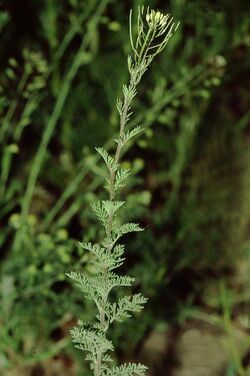Biology:Descurainia sophia
| Descurainia sophia | |
|---|---|

| |
| Scientific classification | |
| Kingdom: | Plantae |
| Clade: | Tracheophytes |
| Clade: | Angiosperms |
| Clade: | Eudicots |
| Clade: | Rosids |
| Order: | Brassicales |
| Family: | Brassicaceae |
| Genus: | Descurainia |
| Species: | D. sophia
|
| Binomial name | |
| Descurainia sophia | |
| Synonyms | |
|
Sisymbrium sophia L. | |
| Wikimedia Commons has media related to Descurainia sophia. |
Descurainia sophia is a member of the family Brassicaceae.[1] Common names include flixweed, herb-Sophia and tansy mustard.[2] It reproduces by seeds. It is a dominant weed in dark brown prairie and black prairie soils of southern Alberta.[3] Its stem is erect, branched, and 4–30 in (10–76 cm) high.[4] It was once given to patients with dysentery and called by ancient herbalists Sophia Chirurgorum, "The Wisdom of Surgeons".[5] It is the type species of the genus Descurainia (named for French botanist and herbalist François Descurain (1658–1749)) and of the rejected genus Sophia Adans.[6][7]
Culinary use
In Iran, the seeds are called khak-e shir (khakshir), and khak-e shir drinks are traditionally favored as thirst quencher during hot summer days.[8] Khakshir is also considered a medicinal substance in traditional Iranian medicine, consumed in varying combinations with other herbs and substances to gain effects ranging from antidiuretic to aphrodisiac.
China has a tradition of eating this plant, and its eating method is recorded in the Jiuhuang Bencao.
Cultural
In German, it is called the Sophienkraut and associated with Saint Sophia of Rome, who was invoked against late frosts.[9]
References
- ↑ 1.0 1.1 "Descurainia sophia (L.) Webb ex Prantl". World Checklist of Selected Plant Families (WCSP). Royal Botanic Gardens (Kew). http://www.theplantlist.org/tpl1.1/record/kew-2761851. Retrieved 12 November 2014.
- ↑ {{citation | mode = cs1 | title = Descurainia sophia | work = Germplasm Resources Information Network (GRIN) | url = https://npgsweb.ars-grin.gov/gringlobal/taxonomydetail.aspx?13568 | publisher = [[Organization:Agricultural Research ServAgricultural Research Service (ARS), United States Department of Agriculture (USDA) | access-date = 12 November 2014 }}
- ↑ http://www.agric.gov.ab.ca/soil/survey-reports/ab11/ab11_report.pdf Wyatt, Newton, Bowser and Odynsky, 1942. Soil Survey of Blackfoot and Calgary Sheets
- ↑ "Flixweed". http://www.co.larimer.co.us/weeds/30weeds/flixweed.htm.
- ↑ botanical.com - A Modern Herbal | Mustards
- ↑ Index Nominum Genericorum
- ↑ Tropicos
- ↑ Amiri, Mohammad Sadegh; Joharchi, Mohammad Reza (2013). "Ethnobotanical investigation of traditional medicinal plants commercialized in the markets of Mashhad, Iran". Avicenna Journal of Phytomedicine 3 (3): 254–271. ISSN 2228-7930. PMID 25050282.
- ↑ Bautz, Traugott, ed (1995). "Sophia von Rom" (in de). Biographisch-Bibliographisches Kirchenlexikon (BBKL). 10. Herzberg: Bautz. cols. 807–808. ISBN 3-88309-062-X. http://www.bbkl.de/s/sophia_v_r.shtml.
Wikidata ☰ Q164143 entry
 |

